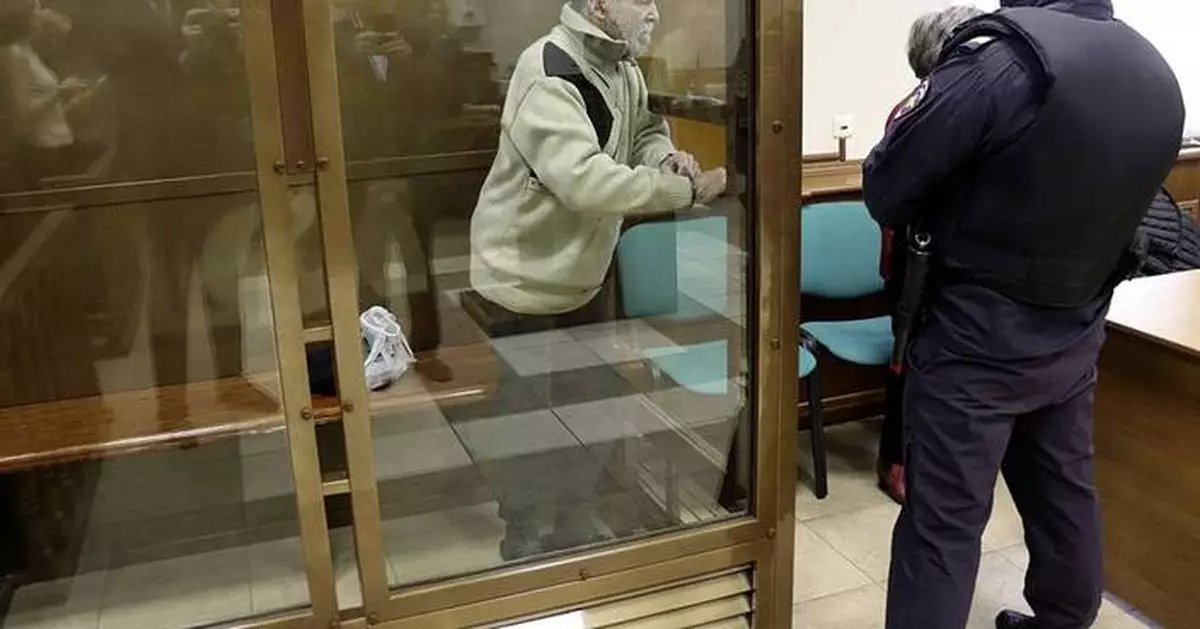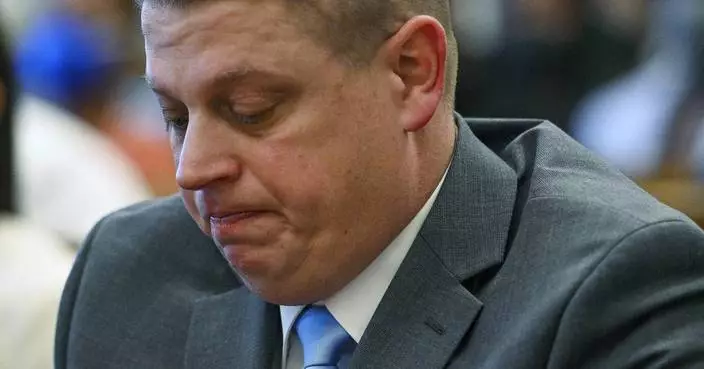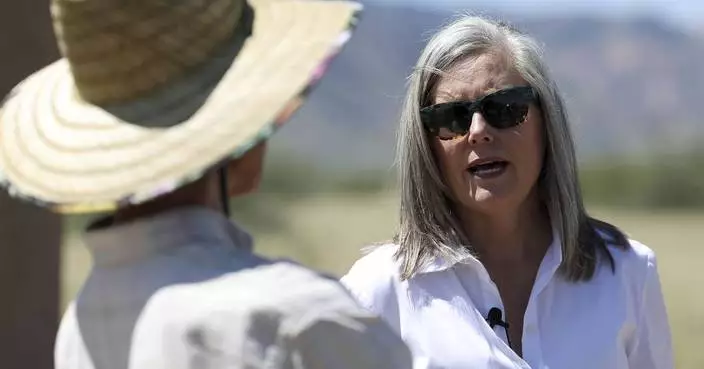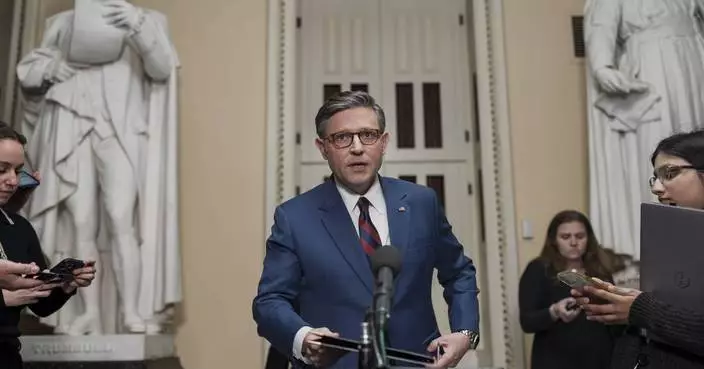MOSCOW (AP) — A Russian court on Monday sentenced a 72-year-old American in a closed trial to nearly seven years in prison for allegedly fighting as a mercenary in Ukraine.
Prosecutors said Stephen Hubbard signed a contract with the Ukrainian military after Russia sent troops into Ukraine in February 2022 and he fought alongside them until being captured two months later.
He was sentenced to six years and 10 months in a general-security prison. Prosecutors had called for a sentence of seven years in a maximum-security prison.
Hubbard, from the state of Michigan, is the first American known to have been convicted on charges of fighting as a mercenary in the Ukrainian conflict.
U.S. State Department spokesman Matthew Miller said that it had limited information about the case as Russia has refused to grant consular access.
“We’re disappointed, as we often are, when they refuse to grant consular access," Miller told reporters in Washington. "They have an obligation to provide it and we’re going to continue to press for it. We’re looking at the case very closely and considering our next steps.”
The charges against Hubbard carried a potential sentence of 15 years, but prosecutors asked that his age be taken into account along with his admission of guilt, Russian news reports said.
Arrests of Americans have become increasingly common in Russia in recent years. Concern has risen that Russia could be targeting U.S. nationals for arrest to use later as bargaining chips in talks to bring back Russians convicted of crimes in the U.S. and Europe.
Also on Monday, a court in the city of Voronezh sentenced American Robert Gilman to seven years and one month for allegedly assaulting law enforcement officers while serving a sentence for another assault.
According to Russian news reports, Gilman was arrested in 2022 for causing a disturbance while intoxicated on a passenger train and then assaulted a police officer while in custody. He is serving a 3½-year sentence on that charge.
Last year, he assaulted a prison inspector during a cell check, then hit an official of the Investigative Committee, resulting in the new sentence, state news agency RIA-Novosti said.
The U.S. and Russia in August completed their largest prisoner swap in post-Soviet history, a deal involving 24 people, many months of negotiations and concessions from other European countries, which released Russians in their custody as part of the exchange. Several U.S. citizens remain behind bars in Russia following the swap.

In this photo released by the Moscow City Court Press Service, Stephen Hubbard, a U.S. citizen accused of fighting as a mercenary in Ukraine against Russia sits in a glass cage during a court session in the Moscow City court in Moscow, Russia, Monday, Oct. 7, 2024. (Moscow City Court Press Service via AP)
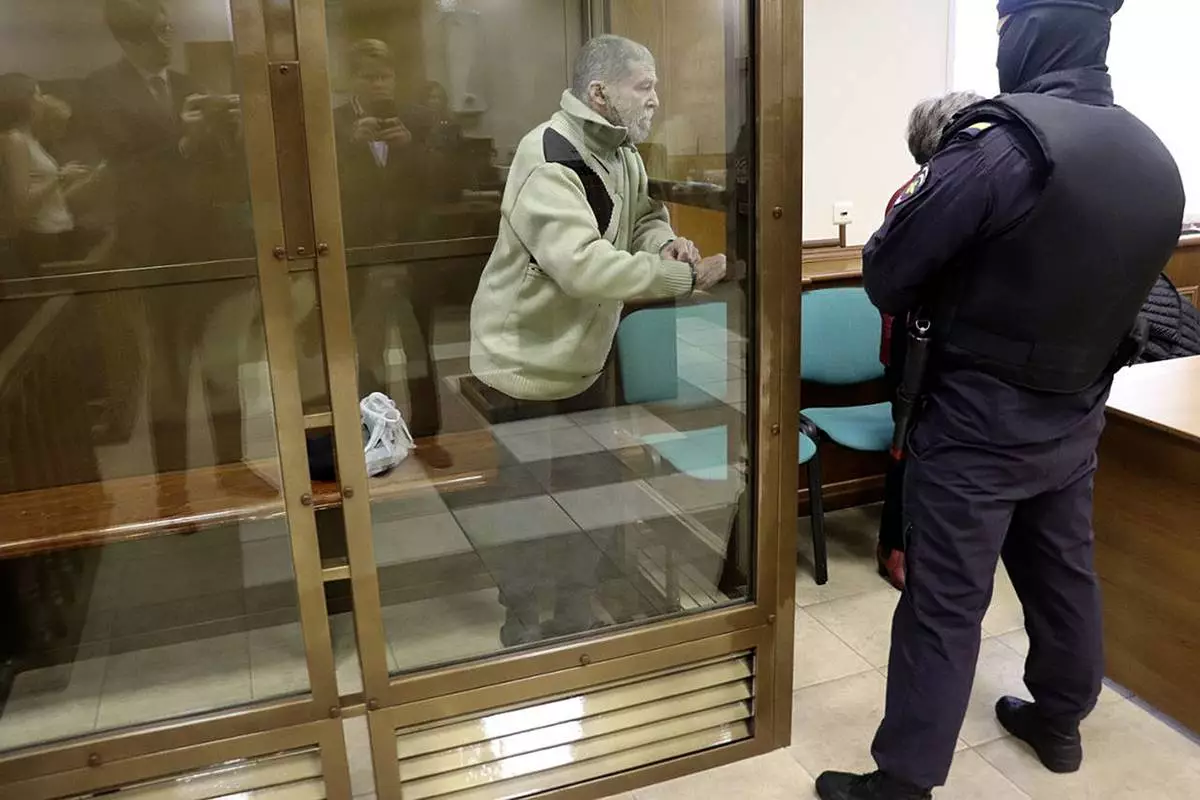
In this photo released by the Moscow City Court Press Service, Stephen Hubbard, a U.S. citizen accused of fighting as a mercenary in Ukraine against Russia stands in a glass cage during a court session in the Moscow City court in Moscow, Russia, Monday, Oct. 7, 2024. (Moscow City Court Press Service via AP)
WASHINGTON (AP) — President Joe Biden secured the 235th judicial confirmation of his presidency Friday, an accomplishment that exceeds his predecessor's total by one after Democrats put extra emphasis on the federal courts following Donald Trump's far-reaching first term, when he filled three seats on the Supreme Court.
Senate Majority Leader Chuck Schumer, D-N.Y., teed up votes Friday on two California district judges, and they will be the last judicial confirmations this year before Congress adjourns and makes way for a new, Republican-led Senate.
The confirmation of Serena Raquel Murillo to be a district judge for the Central District of California broke Trump's mark. The tally also marks the largest number of confirmations in a single term since Jimmy Carter administration. Come next year, Republicans will look to boost Trump's already considerable influence on the makeup of the federal judiciary in his second term.
Biden and Senate Democrats placed particular focus on adding women, minorities and public defenders to the judicial rank. About two-thirds of Biden's appointees are women and a solid majority of appointees are people of color. The most notable appointee was Supreme Court Justice Ketanji Brown Jackson, the first African American woman to serve on the nation's highest court.
“When I ran for President, I promised to build a bench that looks like America and reflects the promise of our nation. And I’m proud I kept my commitment to bolstering confidence in judicial decision-making and outcomes,” Biden said in a statement.
Sen. Dick Durbin, the Democratic chairman of the Senate Judiciary Committee, said that prior to the Democrats' efforts, the number of women on the bench had been diminished, and it was made up overwhelmingly of white males.
“We consciously moved forward to bring more women to the bench, and believe me, we had a great talent pool to work with," Durbin said. "So I think it’ll enhance the image of the court and its work product to bring these new judges on.”
Biden also placed an emphasis on bringing more civil rights lawyers, public defenders and labor rights lawyers to expand the professional backgrounds of the federal judiciary. More than 45 appointees are public defenders and more than two dozen served as civil rights lawyers.
While Biden did get more district judges confirmed than Trump, he had fewer higher-tier circuit court appointments than Trump — 45 compared to 54 for Trump. And he got one Supreme Court appointment compared with three for Trump. Republicans, much to Democrats' frustration, filled Justice Ruth Bader Ginsburg's seat on the court the week before the 2020 presidential election. Ginsburg had passed away in September.
Democrats also faced the challenge of confirming nominees during two years of a 50-50 Senate. Rarely a week went by in the current Congress when Schumer did not tee up votes on judicial confirmations as liberal groups urged Democrats to show the same kind of urgency on judges that Republicans exhibited under Trump.
Some Senate Republicans were harshly critical of Biden's choices. Sen. Ted Cruz, R-Texas, said talk of diversity did not extend to the views of the nominees.
"One of the consequences of the age of Trump is that it drove Democrats insane and it drove them to the extreme left, so they put people on the bench who were selected because they were extreme partisans,” Cruz said.
Liberal-leaning advocacy groups said they are delighted with the number of judges Democrats secured, but even more so with the quality of the nominees. They said diversity in personal and professional backgrounds improves judicial decision-making, helps build public trust and inspires people from all walks of life to pursue legal careers.
“For our federal judiciary to actually deliver equal justice for all, it really has to be for all, and that is one reason why we certainly applaud this administration for prioritizing both professional but also demographic diversity,” said Lena Zwarensteyn, senior director of the fair courts program at The Leadership Conference on Civil and Human Rights.
Sen. Charles Grassley, R-Iowa, and the next chairman of the Senate Judiciary Committee, said Democrats showed newfound resolve on judicial confirmations.
“They learned a lesson from the first Trump administration,” Grassley said. “Paying attention to the number of judges you get and the type of judges you put on the court is worth it.”
Part of the urgency from Democrats came as they watched the nation's highest court overturn abortion protections, eliminate affirmative action in higher education and weaken the federal government's ability to protect the environment, public health and workplace safety through regulations. The cases showed that the balance of power in Washington extends to the judicial branch.
Schumer was jubilant after the vote, saying that one out of four active judges has been appointed under Biden. He said that when it came to judicial nominees, Democrats “cast a wider net” than what he referred to as a “privileged pool.”
“I'm very proud of this milestone, not because the number alone, but because of what the number means,” Schumer said. “It means our bench is now far more balanced in its experiences, expertise and qualifications than four years ago."
Trump will inherit nearly three dozen judicial vacancies, but that number is expected to rise because of Republican-appointed judges who held off on retirement in hopes that a Republican would return to office and pick their replacements.
Sen. Richard Blumenthal, D-Conn., acknowledged that the sense of accomplishment for Democrats is muted somewhat knowing that Trump will have another term to continue shaping the federal judiciary.
“I’m not ready to uncork the champagne just because we’ve done some really good work over the last four years," Blumenthal said. "We need to be prepared to work, hope for the best and try to defeat nominees who are simply unqualified. We have our work cut out for us. The prospects ahead are sobering.”
Grassley promised that he'll work to best Biden's number.
“Let me assure you, by January 20th of 2029, Trump will be bragging about getting 240 judges," Grassley said.
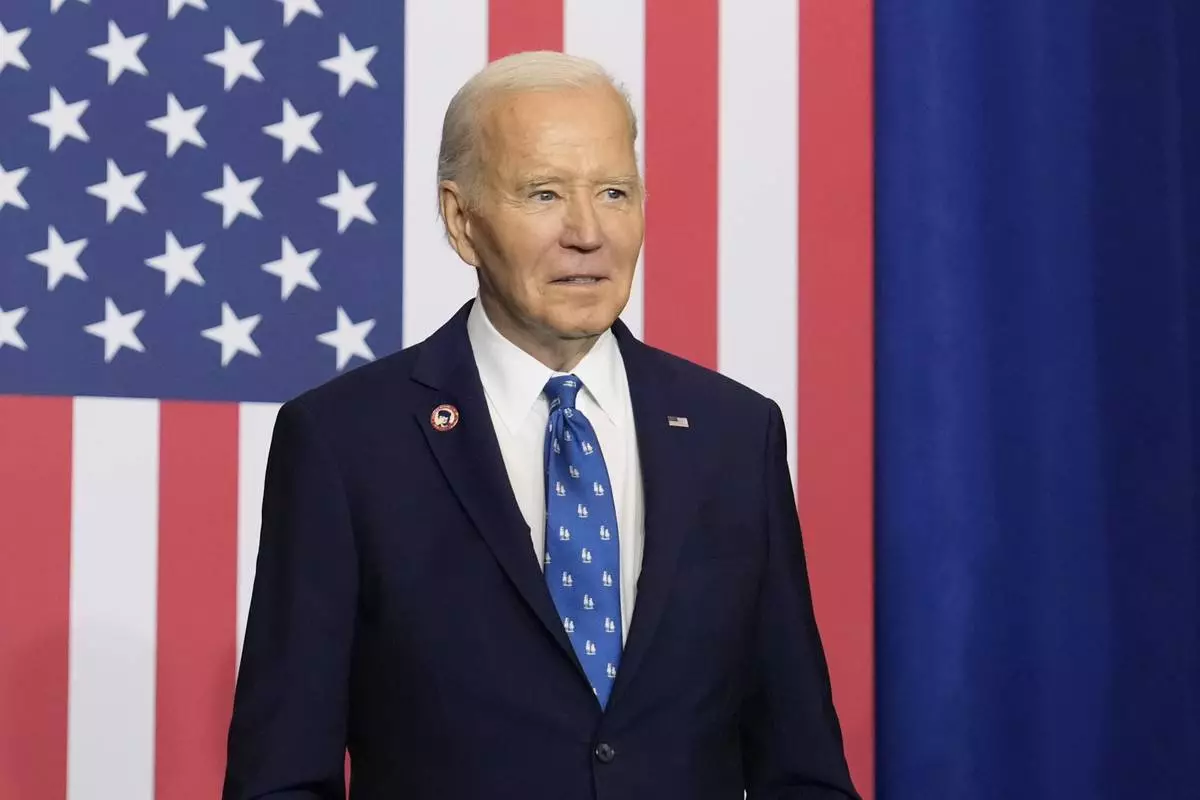
President Joe Biden arrives to speak at the Department of Labor in Washington, Monday, Dec. 16, 2024. (AP Photo/Ben Curtis)




